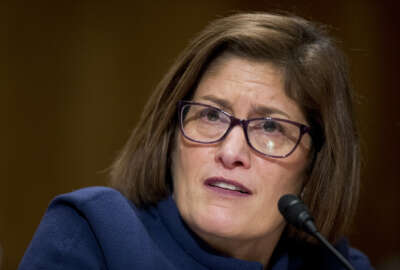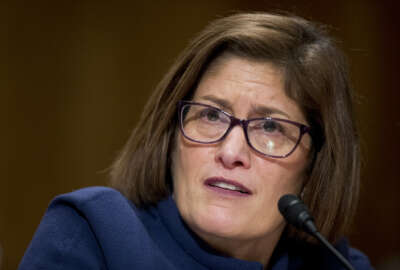
Confusion over OPM IG memo symptom of larger political appointee bottleneck
A court ruling says OPM acting Director Beth Cobert shouldn't be allowed to serve in her role. The administration continues to stand by its nomination. Politica...
The Office of Personnel Management’s Inspector General’s warning that acting Director Beth Cobert is prohibited from serving because of a recent court ruling has many people in Washington scratching their heads and pulling out their law books.
According to the memo, Cobert has been in violation of the Federal Vacancies Reform Act for the past three months — she was formally nominated for the full-time gig in November by President Barack Obama — and any actions she’s taken since then are moot.
OPM Press Secretary Sam Schumach said in a statement that both the agency and administration were following the Justice Department’s view “on the lawfulness of nominees serving in an acting capacity.”
The White House last week said it “continues to rely upon” the FVRA.
“This is shaping up, as far as I can tell, to be a legal battle,” said John Palguta, vice president for policy at the Partnership for Public Service. “Attorneys are disagreeing on whether or not this interpretation, this particular court decision, pertains to Beth Cobert. The administration is saying no, it doesn’t. I think that’s exactly what we’re facing. The sad thing is, obviously her nomination is still pending. I’ve met Beth Cobert, I’ve been in meetings with her. I think she’s immensely qualified.”
The legal pothole was discovered while auditors were researching what to do to fill the position of outgoing OPM IG Patrick McFarland. His last day was Feb. 19.
At issue is an August decision by the U.S. Court of Appeals for the D.C. Circuit. The court rejected an argument from the National Labor Relations Board regarding an acting officer position. The Department of Justice sought additional review from the court.
According to DoJ’s October petition seeking review, the court’s decision “repudiates a longstanding and consistent interpretation of the FVRA on which every President since its enactment has relied.”
“The decision is based on a misreading of the FVRA’s text and structure, and produces results at odds with the Act’s purposes. The decision casts an unwarranted cloud over the designations and service in an acting capacity of many past and present senior officers. And it threatens the ability of future Presidents to fill important posts temporarily with the individuals most suited to carry out those offices’ responsibilities, and to nominate such individuals to permanently fill offices, thereby undermining efficiency and continuity in government operations and programs.”
In late January, the D.C. Circuit denied the petition. The Justice Department has 90 days from Jan. 20 to submit a petition seeking review by the Supreme Court. DoJ did not respond to a request for comment.
“This thing will get resolved by the lawyers at some point,” Palguta said. “The bigger picture is the whole Senate confirmation process needs to be re-examined.”
Palguta said according to the December 2012 Plum Book, about 1,200 positions out of the roughly 4,000 presidential appointee positions require Senate confirmations.
“It’s only going to be highlighted in a little more than nine months, when we know who the next President of the United States is going to be,” Palguta said. “This next person is going to have 4,000 appointee positions, 1,200 of them to be Senate confirmed, just in order to get his or her team in place to make the government run. It’s kind of sobering when you look at the obstacles we put in the way of allowing a new administration to come in and make the government work.”
Stephen Spaulding, senior policy counsel at Common Cause, had a similar reaction to the legal limbo that OPM has found itself in.
“Whoever is right or wrong … sadly this is something that we’ve seen throughout the government,” Spaulding said. “It triple underscores the price that we all pay when the Senate is as gridlocked and as backlogged as it is when it comes to processing executive nominations. Even after the Senate reformed filibuster rules, we saw a backlog of people waiting well over a year to be put in place. That means a lot of acting directors throughout the federal government. That destabilizes and makes it hard for the government to do its job.”
Presidential nominees face tough decisions both personally and professionally, Spaulding said, which can turn into high costs if the person is held in limbo by the Senate.
“This has just been a running theme,” Spaulding said. “It shows the need to really reform the confirmation process.”
Cobert has held the position since July, when former OPM Director Katherine Archuleta resigned.
She also serves as deputy director for management at the Office of Management and Budget. She joined OMB in October 2013 after a 29-year career as a consultant for McKinsey and Co.
OPM has been without a deputy director for more than three years. In August, Retired Rear Adm. Earl L. Gay, Obama’s nominee for deputy OPM director, withdrew his name from consideration after nearly a year waiting on Senate confirmation.
Gay was nominated to replace Christine Griffin, who left the agency in August 2011.
Obama nominated Andrew Mayock, a senior adviser in the Office of the Director at OMB, to replace Cobert as deputy director for management at OMB.
Copyright © 2024 Federal News Network. All rights reserved. This website is not intended for users located within the European Economic Area.




